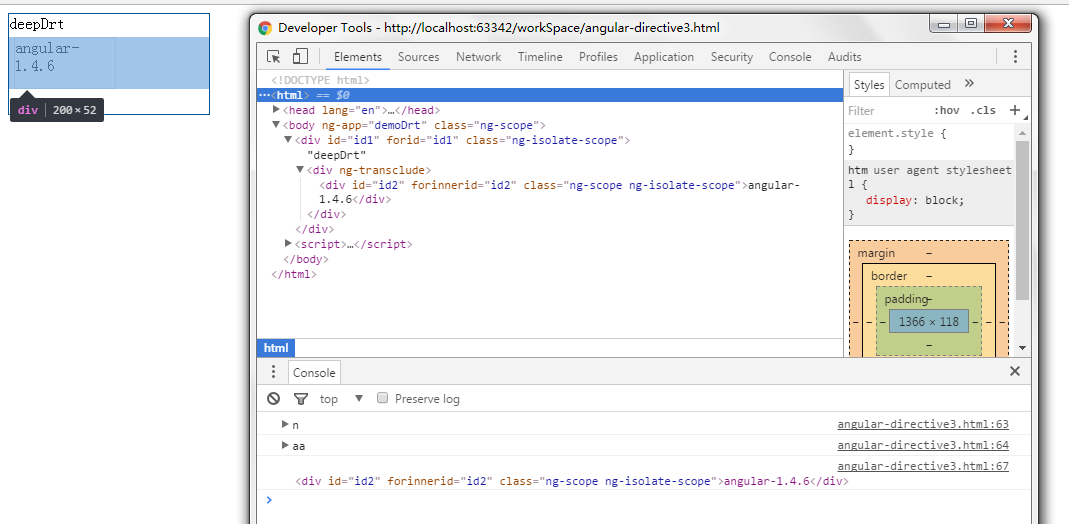angularJS中directive与directive 之间的通信
上一篇讲了directive与controller之间的通信;但是我们directive与directive之间的通信呢?
当我们两个directive嵌套使用的时候怎么保证子directive不会被父directive替换覆盖;及当子directive需要用到父directive中controller某个变量或者方法的时候
怎么实现两个directive之间的通信的。
这里主要讲directive的两个属性:
1.transclude
2.require
html
1 <!DOCTYPE html> 2 <html> 3 <head lang="en"> 4 <meta charset="UTF-8"> 5 <title>angular-directive3</title> 6 <script src="js/angularjs1.4/angular-1.4.6.mini.js"></script> 7 <style type="text/css"> 8 #id1 { 9 width: 200px; 10 height: 100px; 11 border: 1px solid #005599; 12 } 13 #id2 { 14 width: 100px; 15 height: 50px; 16 margin: 5px; 17 border: 1px dotted #cccccc; 18 } 19 </style> 20 </head> 21 <body ng-app="demoDrt"> 22 23 <deep-drt forid="id1"> 24 <inner-drt forinnerid="id2"></inner-drt> 25 </deep-drt> 26 27 </body> 28 </html>
js
1 var demoDrt = angular.module('demoDrt', []); 2 demoDrt.directive('deepDrt', function() { 3 return { 4 restrict:'AE', 5 replace:true, 6 scope : { 7 forid : '@' 8 }, 9 //加上transclude属性true之后在template中结合ng-transclude指令就不会替换子directive, 10 // 如果嵌套有自定义指令而没加transclude属性的话子directive会被父directive的template替换掉 11 transclude:true, 12 //如果有子directive要使用父directive中controller的值的话变量和函数的定义则要使用this来绑定,$scope绑定的话只会在当前作用域生效 13 controller:['$scope', function($scope) { 14 //这个this输出的其实就是controller对象 15 this.name = 'angular'; 16 this.version = '1.4.6'; 17 }], 18 //template 上结合ng-transclude使用,如果ng-transclude放在template的父级的话, 19 // 那么template里面的值会被子directive覆盖,所以我们要用一个dom并加上ng-transclude来在外层包裹子directive。 20 template:'<div id="{{forid}}">deepDrt<div ng-transclude></div></div>' 21 }; 22 }); 23 24 demoDrt.directive('innerDrt', function() { 25 return { 26 restrict:"AE", 27 replace:true, 28 //require主要作用是寻找父directive,'^'表示向上寻找,后面加上父directive的名字,'?'表示如果找不到的话则不会报错, 29 // 一般'^?'两个结合使用当找不到父directive的时候angular不会报错 30 //结合了require 则在子directive的link属性中加上reController,则可以获取父directive中controller的变量和方法 31 require: '^?deepDrt', 32 scope : { 33 forinnerid : '@' 34 }, 35 link : function(scope, element, attr, reController) { 36 console.log(scope); 37 console.log(attr); 38 //reController得到了父controller中绑定的变量和函数 39 element.bind('click', function(e) { 40 console.log(e.target); 41 e.target.innerText = reController.name + '-' + reController.version; 42 }); 43 }, 44 template : '<div id="{{forinnerid}}">innerDrt</div>' 45 } 46 });
directive生成页面结构

通过transclude:true同时在template中结合ng-transclude指令我们能把子directive嵌套在父directive中;而我在注释中也提到了,如果ng-transclude外没有一个dom包裹
子directive的话那字directive也是会被父directive的template替换的。
在子directive中require:'^?deepDrt';具体含义在注释中已经说明。值得注意的是父directive中的controller中定义的变量如果要给子directive使用的话要用this来绑定变量或者方法,this指的就是controller这个对象。子directive中reController得到的就是这个controller对象,从而得到父directive中this定义的变量和属性。
关于angularJS directive之间的通信就这么多;不对之处希望大家指正。谢谢!






